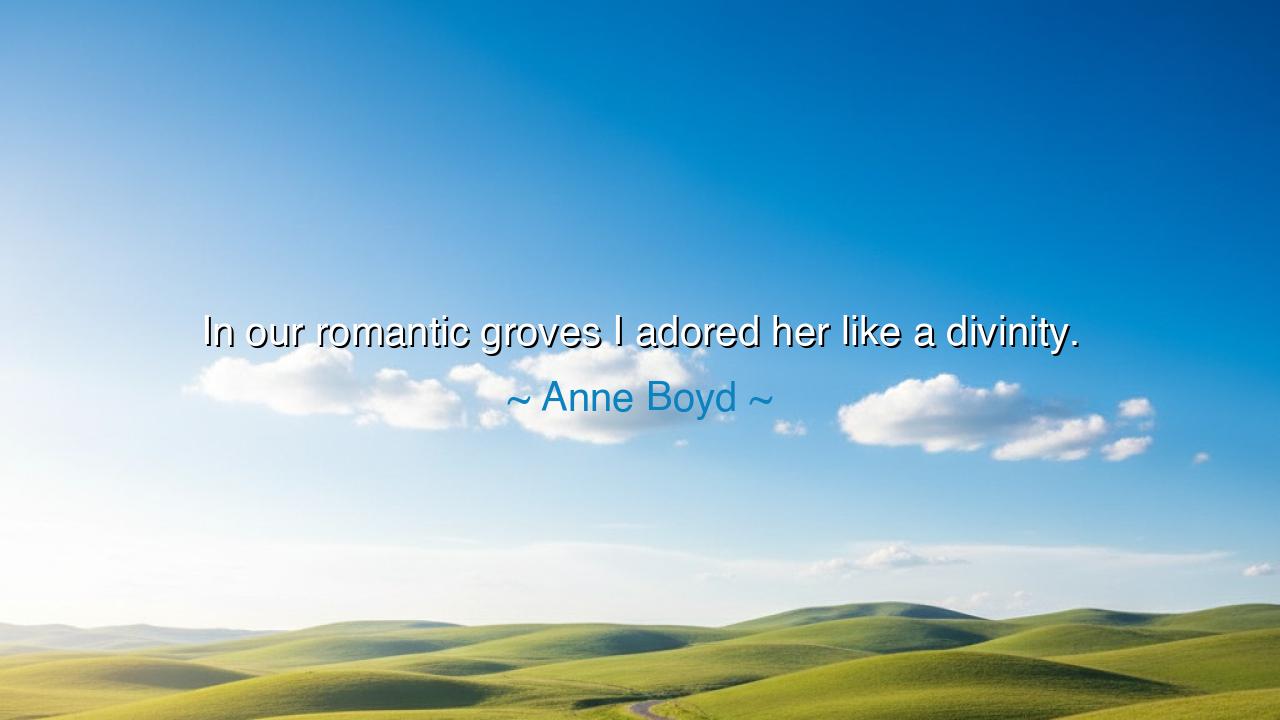
In our romantic groves I adored her like a divinity.






“In our romantic groves I adored her like a divinity.” Thus spoke Anne Boyd, and her words resound with the echoes of ages past, when love was not merely affection but worship, when a beloved was not simply a companion but the embodiment of something eternal and divine. The imagery of the groves calls us back to sacred places, where lovers walked beneath canopies of trees, far from the noise of the world, where love itself became a form of prayer. To adore another “like a divinity” is not exaggeration—it is the ancient human impulse to see in love a reflection of heaven itself.
The ancients themselves sanctified such groves. In Greece, the olive trees of Athena and the laurel of Apollo were not mere plants, but holy spaces where mortals sought communion with gods. Lovers would often retreat to these groves, finding not only the beauty of nature but the presence of the divine. To call a beloved a divinity was to place her beyond the reach of ordinary measure, to declare that her presence brought awe and reverence, as if one were kneeling at the altar of something higher than flesh. Boyd’s words therefore carry the weight of this timeless symbolism—love transformed into worship, affection into sacred devotion.
History offers us countless mirrors of this sentiment. Dante, gazing upon Beatrice, saw not simply a woman, but the gateway to paradise. In her face shone the glory of the eternal, and through her he sought salvation itself. Likewise, the troubadours of medieval Europe sang of courtly love, where the lady was raised high above her suitor, almost untouchable, revered as both mortal and more-than-mortal. In all these examples, love was not content with the ordinary; it became adoration, and the beloved became divinity.
Yet we must also hear the caution in such exaltation. To see another as divine is to risk forgetting their humanity. The romantic grove is a place of beauty, but it is also a place of illusion. Many through history have been broken by the weight of such worship, when the one adored failed to meet the impossible image of perfection. Still, even knowing this, the human heart cannot resist lifting love to the realm of gods. For in the act of adoration itself, the lover is transformed, purified, and ennobled, even if the vision proves fleeting.
The true power of Boyd’s words lies not only in the image of worship but in the groves themselves. The grove is removed from the world of commerce, politics, and toil. It is a sanctuary where time slows, where the heart remembers what is sacred. To adore “like a divinity” in such a place means to create, even if for a moment, a world untouched by cruelty, a world where love reigns as the highest law. This is the dream that every age has sought in its poetry, its music, its whispered vows beneath trees and stars.
From this, we learn a lesson both profound and humbling: let your love have reverence. Do not treat affection as a passing amusement or a shallow bond, but as something sacred, something that lifts both souls higher. When you walk in your own romantic groves, whether they be real or symbolic, approach your beloved with awe, gratitude, and humility. See in them not perfection, but the reflection of the divine spark that dwells in every human heart.
Practical action flows naturally from this: create your own sanctuaries of love. It need not be a grove of trees—perhaps it is a quiet corner of your home, a walk in the evening, a shared ritual of tenderness. In those spaces, let your heart speak not in casual tones but with reverence. Adore not blindly, but deeply. And in doing so, you will transform your love from mere emotion into a sacred act, as the ancients once did beneath their sacred groves.
So, children of tomorrow, remember Anne Boyd’s words. In the romantic groves of your own life, love with reverence, and do not be ashamed to adore like a divinity. For though the world may call it folly, it is in such holy folly that the human heart finds its noblest truth: that to love is to worship, and in worship, we glimpse eternity.






AAdministratorAdministrator
Welcome, honored guests. Please leave a comment, we will respond soon